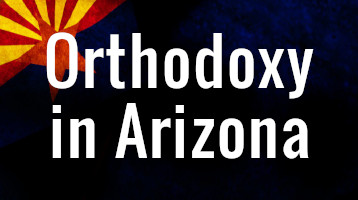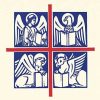Each Day in Holy Week is devoted to a particular theme. Review these each day with members of your family, especially your children, during the coming week.
The Beginning of the Cross
Lazarus Saturday
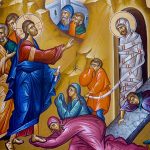 “Having fulfilled Forty Days… we ask to see the Holy Week of Thy Passion.”
“Having fulfilled Forty Days… we ask to see the Holy Week of Thy Passion.”
With these words sung at Vespers, Lent comes to its end and we enter into the annual commemoration of Christ’s suffering, death and Resurrection. It begins on Lazarus Saturday. The double feast of Lazarus’ resurrection and the Entrance of the Lord to Jerusalem (Palm Sunday) is described in liturgical texts as the “beginning of the Cross” and is to be understood therefore, within the context of the Holy Week. Baptisms normally occur at ASONA on Lazarus Saturday, so that the catechumens may enter into Holy Week and the Passion of Christ as full members of the Church.
Palm Sunday
 The Entrance of our Lord into Jerusalem is one of the Twelve Great Feasts of the Christian Faith, and celebrated with great honor. We forget so often that the Kingdom of God has already been inaugurated and that on the day of our Baptism we were made citizens of it and promised to put our loyalty to it above all other loyalties. We must remember that for a few hours Christ was indeed King on earth in this world of ours, for a few hours only and in one city. We commemorate his entrance into His saving Passion for us, and like the Apostle Thomas, prepare ourselves to “go and die with Him,” following the services of Holy Week which follow. A grand procession of palms normally takes place at the end this Sunday’s service.
The Entrance of our Lord into Jerusalem is one of the Twelve Great Feasts of the Christian Faith, and celebrated with great honor. We forget so often that the Kingdom of God has already been inaugurated and that on the day of our Baptism we were made citizens of it and promised to put our loyalty to it above all other loyalties. We must remember that for a few hours Christ was indeed King on earth in this world of ours, for a few hours only and in one city. We commemorate his entrance into His saving Passion for us, and like the Apostle Thomas, prepare ourselves to “go and die with Him,” following the services of Holy Week which follow. A grand procession of palms normally takes place at the end this Sunday’s service.
Holy Week Begins
On Palm Sunday evening the Services of Holy Week begin. The Long Gospel readings on the first three days divulge the entire content of the final discourses of Christ. In these discourses he is far from the “sweet Jesus” of popular imagery. He speaks with clarity concerning the end of this age.
Bridegroom Matins
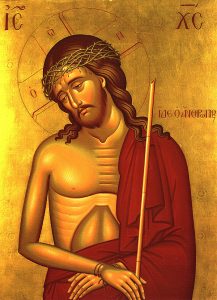 The Church celebrates “Bridegroom” services on the evenings of Holy Week. These Bridegroom Services are derived from the Parable of the Ten Virgins, which calls for preparedness at the Second Coming, for;
The Church celebrates “Bridegroom” services on the evenings of Holy Week. These Bridegroom Services are derived from the Parable of the Ten Virgins, which calls for preparedness at the Second Coming, for;
“…at midnight there was a cry, ‘Here is the bridegroom! Come out to meet him…’ Watch therefore, for you know neither the day nor the hour.” (Matthew 25:6, 13)
Pascha is not an annual commemoration — solemn and beautiful — of a past event. It is this Event itself shown, given to us, as always efficient, always revealing our world, our time, our life as being at their End, and announcing the Beginning of the new life… And the function of the three first days of the Holy Week is precisely to challenge us with this ultimate meaning of Pascha and to prepare us to the understanding and acceptance of it.
This eschatological challenge which is final and decisive, is revealed, first, in the common troparion of these days:
“Behold, the Bridegroom cometh at midnight and blessed is he whom He shall find watching, but unworthy is he whom He shall find heedless. Beware, therefore, O my soul, do not be weighed down with sleep, lest you be given up and shut out from the Kingdom. But, rouse yourself crying: Holy, Holy, Holy art Thou, O God. Through the Theotokos, have mercy on us.”
Holy Monday
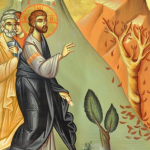 Theme: The Barren Fig Tree
Theme: The Barren Fig Tree
The Theme of Monday in Holy Week is the barren fig tree, a symbol of Israel, which yields no fruit and is condemned, reminding us that believing is not enough – we must bear fruit before the Coming of the Lord. The story of the fig tree, the symbol of the nation of Israel – the chosen people – created to bear spiritual fruits and failing in its response to God. The time has passed, and it has been judged.
The message for believers is very clear: bear spiritual fruit now, and do not wait, for the Just Judge will come when you do not expect Him.
Holy Tuesday
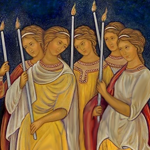 Theme: The Parable of the Ten Virgins: Five of whom were wise, five of whom were foolish
Theme: The Parable of the Ten Virgins: Five of whom were wise, five of whom were foolish
On Holy Tuesday we remember the parable of the Ten Virgins, five of whom were wise, five of whom were foolish, and the parable of the Talents. Like the wise virgins, we must be ready, and prepared, for the unexpected Coming of the Lord. Midnight is the moment when the old day comes to its end and a new day begins. It is thus the symbol of the time in which we live as Christians.
We are filled with “holy fear” as we listen to Him prophesy the Last Judgment (Matthew 24:36-26:2).
Holy Wednesday
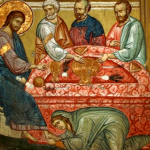 Theme: The Ocean of Difference between Love and Greed
Theme: The Ocean of Difference between Love and Greed
Holy Wednesday commemorates the repentance of the sinful woman, and compares her with Judas, who speeds to betray and sell the Creator of the Universe for 30 pieces of silver with the admonition “greed cannot distinguish value”. The service of the Mystery of Holy Unction is often celebrated on Wednesday evening, to prepare us for entrance into Christ’s Resurrection. We also remember His great humility, and the washing of the feet of the 12 Apostles in Anticipation of the Holy Eucharist. One warning, one exhortation runs through all of them: the end and the judgement are approaching, let us prepare for them.
Holy Thursday
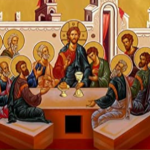 Theme: The Last Supper and the Betrayal by Judas
Theme: The Last Supper and the Betrayal by Judas
The Last Supper is the ultimate revelation of God’s redeeming love for man. The betrayal by Judas reveals that sin, death and self-destruction are the alternative. The entire mission of Christ, and indeed the very purpose for the creation of the world in the first place, is so that God’s beloved creature, made in His own divine image and likeness, could be in the most intimate communion with Him for eternity, sitting at table with Him, eating and drinking in His unending kingdom. The paths leading from the Lord’s Table are slumber (like the Apostles in Gethsemane), peridition and death (like Judas), or a sacrificial death, and resurrection (like our Lord Jesus Christ).
Great & Holy Friday
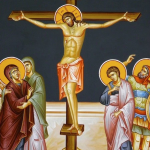 Theme: The Cross and the Destruction of Death
Theme: The Cross and the Destruction of Death
The Matins service, celebrated on Thursday night, recounts the betrayal and crucifixion of our Lord. The 12 Passion Gospels are read, recounting the entire Scriptural account of the Lord’s Passion. The entire Biblical account is a moving and somber recollection. On Friday afternoon, Vespers of Good Friday is celebrated, after which the Tomb of the Lord is decorated with flowers, and we normally begin our Vigil, remaining with the Lord, reading the Psalms over the Tomb and Shroud of Christ until the Paschal Vigil. Good Friday deals not with past alone. It is the day of Sin, the day of Evil, the day on which the Church invites us to realize their awful reality and power in “this world.”
Holy Saturday
 Theme: The Great and Holy Sabbath!
Theme: The Great and Holy Sabbath!
Holy Saturday celebrates the Great Sabbath, when our Lord Jesus Christ rested, in the tomb, from His labors for our salvation. It also uniquely commemorates the victory of Christ over the powers of hell. During the Matins (sung on Friday night) the Lamentations of the Righteous Man Who loves the Law of the Lord, our Lord Jesus Christ, as presented in Ps. 119.
The Saturday Liturgy is especially joyful, as the cloths of the Church are changed from Dark to White in anticipation of the Resurrection!
Pascha – The King of Feasts!
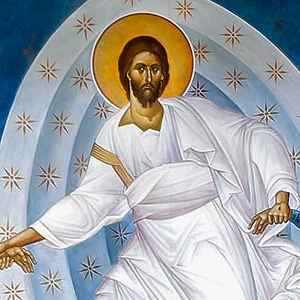
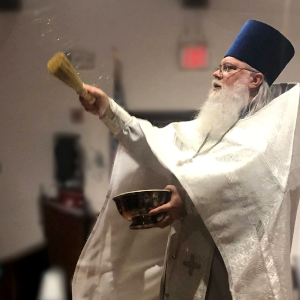 The Great Resurrection of our Lord Jesus Christ! This is the King of Feasts, the Holy Day of Holy Days! This is the starting point for our understanding of the sanctification of time. This is the center and foundation of the entire Christian faith. If Christ is not risen, our faith is in vain. If Christ is not risen, then the life of mankind is a hopeless abyss. But Christ IS Risen! This is the Gospel! It is the Orthodox experience, which goes back to the apostles themselves, that in the center of our liturgical life, in the very center of that time which we measure as year, we find the Feast of Christ’s Resurrection. We celebrate the Resurrection of Christ as the greatest event in human history! Death no longer has sway over mankind. On this day, we proclaim the festal hymn,
The Great Resurrection of our Lord Jesus Christ! This is the King of Feasts, the Holy Day of Holy Days! This is the starting point for our understanding of the sanctification of time. This is the center and foundation of the entire Christian faith. If Christ is not risen, our faith is in vain. If Christ is not risen, then the life of mankind is a hopeless abyss. But Christ IS Risen! This is the Gospel! It is the Orthodox experience, which goes back to the apostles themselves, that in the center of our liturgical life, in the very center of that time which we measure as year, we find the Feast of Christ’s Resurrection. We celebrate the Resurrection of Christ as the greatest event in human history! Death no longer has sway over mankind. On this day, we proclaim the festal hymn,
“Christ is risen from the dead, trampling down death by death,
and upon those in the tombs bestowing life!”
This service begins at 11:30 pm Saturday night, going from dark to light, and we begin our feast immediately afterwards, with the blessing of Pascha Baskets. There is no service on Sunday morning, but a joyous Paschal Vespers at 12 Noon!


